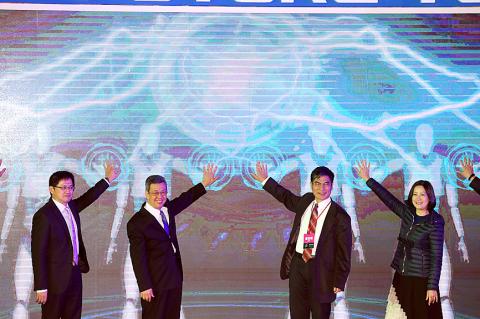The Future Tech exposition next month is to showcase 88 cutting-edge technologies, including 11 inventions, Minister of Science and Technology Chen Liang-gee (陳良基) said yesterday, forecasting that the four-day show would attract up to 100,000 visitors.
Scheduled to take place from Dec. 5 to Dec. 8 at the Taipei World Trade Center, the third annual exhibition is to present technologies developed by academics that show a spirit of “disruptive innovation,” Chen told a news conference in Taipei.
The 88 technologies — selected out of more than 500 applications — relate to artificial intelligence (AI) and the Internet of Things, electronics and optoelectronics, smart machinery and new materials, biotechnology and new medicine, medical materials, smart disaster prevention, semiconductor applications, sports training and space technology, he said.

Photo: CNA
A team named iTech has developed the first commercialized radio frequency front-end module for wireless positioning under the leadership of National Taiwan University’s Graduate Institute of Communication Engineering professor Mao Shau-gang (毛紹綱), who secured a US$5 million order for the module at the Viva Technology show in Paris in May.
Using the module, the team’s three products — iShield, iPosition and iFollow — can detect uncrewed aerial vehicles, identify the position of moving objects and track driverless machines, Mao said.
The team has reached out to companies involved in robotics, healthcare and automobiles in Taiwan, the US and Europe, and plans to start a firm next year, he said.
National Chiao Tung University electrical and computer engineering professor Chiou Jin-chern (邱俊誠) led another team in a nine-year effort to develop contact lenses with sensing circuits that can measure eye moisture, temperature and drug efficacy.
Featuring gold-made circuits, the lenses are made of hydrogels and embedded with a Taiwan Semiconductor Manufacturing Co (TSMC, 台積電) chip measuring 1.2mm2, he said.
While Google had failed in its attempt to produce similar contact lenses for monitoring blood sugar levels, the team has succeeded in producing smart contacts, which are to undergo clinical testing soon, he added.
Taipei Computer Association chairman Tung Tzu-hsien (童子賢) was upbeat about the outlook for small and medium-sized AI products, especially those used in healthcare, saying academic achievements do not have to be kept in an ivory tower.
Future Tech helps to shape an atmosphere that encourages students to get involved in technological innovations, so the nation’s advancement is not merely driven by top-down policy, Tung added.

MAKING WAVES: China’s maritime militia could become a nontraditional threat in war, clogging up shipping lanes to prevent US or Japanese intervention, a report said About 1,900 Chinese ships flying flags of convenience and fishing vessels that participated in China’s military exercises around Taiwan last month and in January last year have been listed for monitoring, Coast Guard Administration (CGA) Deputy Director-General Hsieh Ching-chin (謝慶欽) said yesterday. Following amendments to the Commercial Port Act (商港法) and the Law of Ships (船舶法) last month, the CGA can designate possible berthing areas or deny ports of call for vessels suspected of loitering around areas where undersea cables can be accessed, Oceans Affairs Council Minister Kuan Bi-ling (管碧玲) said. The list of suspected ships, originally 300, had risen to about

DAREDEVIL: Honnold said it had always been a dream of his to climb Taipei 101, while a Netflix producer said the skyscraper was ‘a real icon of this country’ US climber Alex Honnold yesterday took on Taiwan’s tallest building, becoming the first person to scale Taipei 101 without a rope, harness or safety net. Hundreds of spectators gathered at the base of the 101-story skyscraper to watch Honnold, 40, embark on his daredevil feat, which was also broadcast live on Netflix. Dressed in a red T-shirt and yellow custom-made climbing shoes, Honnold swiftly moved up the southeast face of the glass and steel building. At one point, he stepped onto a platform midway up to wave down at fans and onlookers who were taking photos. People watching from inside

Japan’s strategic alliance with the US would collapse if Tokyo were to turn away from a conflict in Taiwan, Japanese Prime Minister Sanae Takaichi said yesterday, but distanced herself from previous comments that suggested a possible military response in such an event. Takaichi expressed her latest views on a nationally broadcast TV program late on Monday, where an opposition party leader criticized her for igniting tensions with China with the earlier remarks. Ties between Japan and China have sunk to the worst level in years after Takaichi said in November that a hypothetical Chinese attack on Taiwan could bring about a Japanese

The WHO ignored early COVID-19 warnings from Taiwan, US Deputy Secretary of Health and Human Services Jim O’Neill said on Friday, as part of justification for Washington withdrawing from the global health body. US Secretary of State Marco Rubio on Thursday said that the US was pulling out of the UN agency, as it failed to fulfill its responsibilities during the COVID-19 pandemic. The WHO “ignored early COVID warnings from Taiwan in 2019 by pretending Taiwan did not exist, O’Neill wrote on X on Friday, Taiwan time. “It ignored rigorous science and promoted lockdowns.” The US will “continue international coordination on infectious